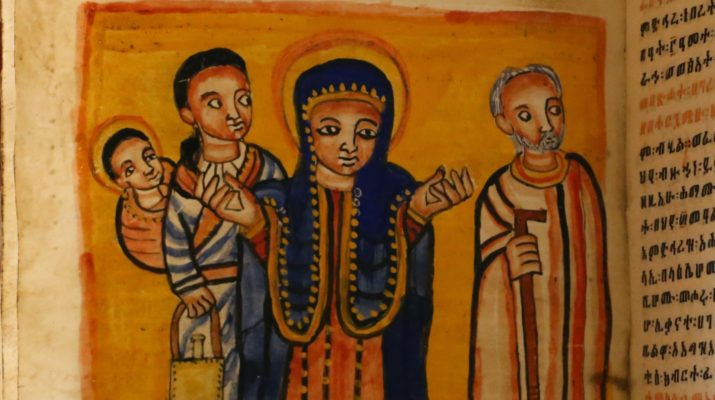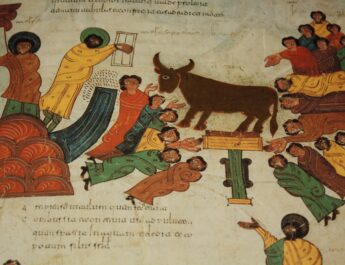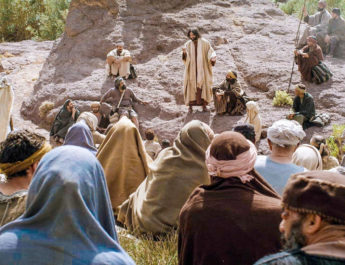Deuteronomy 15:1-2, 7-11
Narrative Lectionary
1 “EveryA seventhB yearC you shall grantD a remissionE of debts.
A “every” = qets. Literally, “at the end of.” From qatsats (to cut or chop off in a literal or figurative sense). This is outer border, end, or extremity. It can also mean infinite.
B “seventh” = sheba. This is seven or by sevenfold. It can also be used to imply a week or an indefinite number. Symbolically, this is the number of fullness, sacredness, perfection.
C “year” = shanah. From shana (to change, alter). This is a year, age, old. It can also mean yearly.
D “grant” = asah. This is to make, do, act, appoint, become in many senses.
E “remission” = shemittah. 5x in OT – all in Deuteronomy. From shamat (to allow something to drop, release, stumble, upset, let alone, remit, lose). This is a release or remission. It can be a cancelling of debt or pause of labor.
2 And this is the mannerF of the remission: everyG creditorH
F “manner” = dabar. From dabar (to speak, declare, discuss). This is speech, a word, a matter, an affair, charge, command, message, promise, purpose, report, request. It is a word, which implies things that are spoken of in a wide sense.
G “every” = kol. From kalal (to complete). This is all or every.
H “creditor” = baal + mashsheh + yad. Baal is from ba’al (to marry, have dominion, be master). This is lord, owner, ally, master, or archer. Mashsheh is 1x in OT. From nashah (to deceive, lend with interest, debtor, delude, seduce); related to nashah (to forget, neglect, remove, deprive). This is a loan or debt. Yad is hand, ability, power. Hand in a literal sense, but also what one can do or the means by which one does it.
shall remitI the claim that is heldJ against a neighbor,K
I “remit” = shamat. Related to “remission” in v1. 9x in OT. See note E above.
J “held” = nashah. Related to “creditor” in v2. 13x in OT. See note H above.
K “neighbor” = rea. From raah (to associate with). This is the same as neighbor in Leviticus 19:18 “love your neighbor as yourself.” This is friend, companion, fellow, neighbor. It is someone with whom you associate, whether more or less close.
not exactingL it,M because the Lord’sN remission has been proclaimed.O
L “exacting” = nagas. This is driving an animal, worker, debtor, or an army. By implication, it can mean to tax, harass, distress, oppress, or tyrannize. This word can be used for taskmaster or overseer.
M Some manuscripts “of a neighbor who is a member of the community” = rea + et + ach. Rea is the same as “neighbor” in v2. See note K above. Ach is brother, kindred, another, other, like. It is literally brother, but it can also be someone who is similar, resembling, or related to.
N “Lord’s” = YHVH. From havah (to be, become) or hayah (to come to pass, become, be). This is the name of the God of Israel, the self-existent and eternal one, the tetragrammaton. This pronunciation has been lost to time so “Lord” is generally used in its place.
O “proclaimed” = qara. This is to call or call out – to call someone by name. Also used more broadly for calling forth.
7 “If there isP among you anyoneQ in need,R a member of your communityS
P “is” = hayah. Related to “Lord’s” in v2. See note N above.
Q “anyone” = echad. Perhaps from achad (to unify, continue on a path; figuratively, to gather one’s thoughts). This is the number one, first, united. It can also be alone, altogether, a certain, a few.
R “in need” = ebyon. From abah (to consent, obey, want, yield, accept). This is needy, poor, beggar. Someone who is wanting.
S “community” = ach. Same as {untranslated} in v2. See note M above.
in anyT of your townsU within the landV that the Lord your GodW is givingX you,
T “any” = echad. Same as “anyone” in v7. See note Q above.
U “towns” = shaar. May be related to sha’ar (to calculate or reckon; may come from a root that means to open up or split). This is a gate, door, or other opening like a port.
V “land” = erets. Root may mean to be firm. This is earth, ground, field land, or country.
W “God” = Elohim.
X “giving” = natan. This is to give, put, set, offer. It is to give literally or figuratively.
do not be hard-heartedY or tight-fistedZ toward your needyAA neighbor.BB
Y “be hard-hearted” = amets + et + lebab. Amets is to be strong, stout, alert, or bold, It can also mean harden, make firm, be courageous or mighty, fortify, or establish. It can refer to physical alertness or mental courage or steadfastness. Lebab may be related to labab (to encourage; properly, to be encased as with fat; used in a good sense, this means to transport someone with love; used in a bad sense, it can mean to dull one’s senses). This is the heart, courage, one’s inner self, the mind, or the will. Heart is only used in a figurative sense in the Old and New Testaments.
Z “tight-fisted” = qaphats + et + yad. Literally, “close your hand.” Qaphats is 7x in OT. This is to close, shut, contract. It can be used of hand or mouth, withdrawing compassion, or the way one contracts in death. It can also mean leaping as the body contracts over and over. Yad is the same as “creditor” in v2. See note H above.
AA “needy” = ebyon. Same as “in need” in v7. See note R above.
BB “neighbor” = ach. Same as {untranslated} in v2. See note M above.
8 You should rather openCC your hand,DD willingly lendingEE
CC “open” = patach + patach. This is to open wide in a literal or figurative sense. So, it is open, draw out, let something go free, break forth. It can also mean to plow, engrave, or carve. = The word is repeated twice – the first time as an Infinitive Absolute. The Infinitive Absolute serves to emphasize the sentiment of the word. It is rather like Foghorn Leghorn’s speech pattern, “I said, I said.”
DD “hand” = yad. Same as “creditor” in v2. See note H above.
EE “willingly lending” = abat + abat. 6x in OT – 5x in Deuteronomy & 1x in Joel. From abot (pledge, pawn). This is to borrow or lend, especially when something is exchanged in pledge. It can also mean to swerve or entangle. = The word is repeated twice – the first time as an Infinitive Absolute. The Infinitive Absolute serves to emphasize the sentiment of the word. It is rather like Foghorn Leghorn’s speech pattern, “I said, I said.”
enoughFF to meet the need,GG whatever it may be.HH 9 Be carefulII that you do notJJ entertainKK
FF “enough” = day. This is enough, plenty, overflow, or ability.
GG “need” = machsor. 13x in OT. From chaser (to lack, need, become empty, to fail). Related to “I shall not want” from Psalm 23:1. This is something needed so it could be lack, poverty, or deficiency.
HH “be” = chaser. Related to “need” in v8. See note GG above.
II “be careful” = shamar. This is to keep, watch, or preserve. It means to guard something or to protect it as a thorny hedge protects something.
JJ “that…not” = pen. Perhaps from panah (to turn, face, appear). This is lest, if, or.
KK “entertain” = hayah. Same as “is” in v7. See note P above.
a meanLL thought,MM, NN thinking,OO
LL “mean” = beliyyaal. From beli (lack, nothing, without, wearing out, failure, destruction); {from balah (to grow old, wear out, waste away, consume, spend)} + yaal (to gain, profit, do good, ascend, be useful or valuable; benefitted). This is lacking profit i.e. worthlessness, destruction, evil, ungodly person, wickedness, or Belial.
MM “thought” = dabar. Same as “manner” in v2. See note F above.
NN {untranslated} = lebab. Same as “be hard-heated” in v7. See note Y above.
OO “thinking” = amar. This is to speak, say, answer, command, promise, report.
‘The seventh year, the year of remission, is near,’PP and therefore view your needy neighborQQ with hostilityRR and give nothing;
PP “is near” = qarab. This is to come near, offer, make ready, approach, take.
QQ “neighbor” = ach. Same as {untranslated} in v2. See note M above.
RR “view…with hostility” = ra’a’ + ayin. Literally, “let your eye be evil.” Ra’a’ is to be evil, bad, afflict. Properly, it means to spoil – to destroy by breaking into pieces. Figuratively, it is to cause something to be worthless. It is bad in a physical, social, or moral sense – something that displeases, does harm or mischief, punishes or vexes. Ayin is eye in a literal or figurative sense so eye, appearance, favor, or a fountain (the eye of the landscape).
your neighbor might crySS to the Lord against you, and you would incurTT guilt.UU 10 Give liberallyVV and be ungrudgingWW
SS “cry” = qara. Same as “proclaimed” in v2. See note O above.
TT “incur” = hayah. Same as “is” in v7. See note P above.
UU “guilt” = chet. From chata (to miss, sin, bear blame, to forfeit, lack). This is sin, fault, or punishment of sin.
VV “give liberally” = natan + natan. Same as “giving” in v7. See note X above. The word is repeated twice – the first time as an Infinitive Absolute. The Infinitive Absolute serves to emphasize the sentiment of the word. It is rather like Foghorn Leghorn’s speech pattern, “I said, I said.”
WW “be ungrudging” = lo + ra’a’ + lebab. Literally, “not let your heart be grieved.” Ra’a’ is the same as “view…with hostility” in v9. See note RR above. Lebab is the same as “be hard-hearted” in v7. See note Y above.
when you doXX so, for onYY this accountZZ the LordAAA your God
XX “do” = natan. Same as “giving” in v7. See note X above.
YY “on” = galal. 10x in OT. Perhaps from galal (to roll in a literal or figurative sense). This is an account or because.
ZZ “account” = dabar. Same as “manner” in v2. See note F above.
AAA “Lord” = YHVH. Related to “Lord’s” in v2 & “is” in v7. From the same as YHVH (see note N above). This is a secondary spelling of the Lord, the name of the God of Israel. It has the same meaning.
will blessBBB you in allCCC your workDDD and in all that you undertake.EEE
BBB “bless” = barak. This is to kneel, to bless. It is blessing God as part of worship and adoration or blessing humans to help them. It can be used as a euphemism to say curse God.
CCC “all” = kol. Same as “every” in v2. See note G above.
DDD “work” = maaseh. Related to “grant” in v1. From asah (see note D above). This is a work – any action whether positive or negative. It can also be a transaction, construction, activity, property, or something that is produced.
EEE “undertake” = mishloach + yad. Literally, “to which you put your hand.” Mishloach is 10x in OT. From shalach (to send, send for, forsake, give a slave freedom). This is a sending out, an undertaking, a putting forth. Yad is the same as “creditor” in v2. See note H above.
11 Since there will never ceaseFFF to be some in needGGG onHHH the earth,III
FFF “cease” = chadal. This is properly to be flabby – it implies, to stop, fall, end, rest, leave alone, forsake, or desist. Figuratively this can be lacking or idle.
GGG “some in need” = ebyon. Same as “in need” in v7. See note R above.
HHH “on” = qereb. Related to “is near” in v9. Perhaps from qarab (see note PP above). This is among, in the midst, before, the center It is the inward part, whether literal or figurative. It can also be used for the heart, the site of thoughts and feelings. This word is also used as a technical term for the entrails of the animals who are sacrificed.
III “earth” = erets. Same as “land” in v7. See note V above.
I thereforeJJJ commandKKK you,LLL
JJJ “therefore” = al + ken. Ken is perhaps from kun (properly, in a perpendicular position; literally, to establish, fix, fasten, prepare; figuratively, it is certainty, to be firm, faithfulness, render sure or prosperous). This is to set upright. Generally used figuratively to mean thus, so, afterwards, rightly so.
KKK “command” = tsavah. This is to charge, command, order, appoint, or enjoin. This is the root that the Hebrew word for “commandment” comes from (mitsvah).
LLL {untranslated} = amar. Same as “thinking” in v9. See note OO above.
‘OpenMMM your hand to the poorNNN and needy neighborOOO in your land.’
MMM “open” = patach + patach. Same as “open” in v8. See note CC above. The word is repeated twice – the first time as an Infinitive Absolute. The Infinitive Absolute serves to emphasize the sentiment of the word. It is rather like Foghorn Leghorn’s speech pattern, “I said, I said.”
NNN “poor” = ani. From anah (to be bowed down; humility or being browbeaten, oppressed, afflicted, or depressed; literal or figurative – depressed in mood or circumstance). This is humble, lowly, poor, or afflicted.
OOO “neighbor” = ach. Same as {untranslated} in v2. See note M above.
Image credit: “Yeha, chiesa di abuna aftse, museo, manoscritto del xviii secolo.” Photo by Sailko, 2018.




